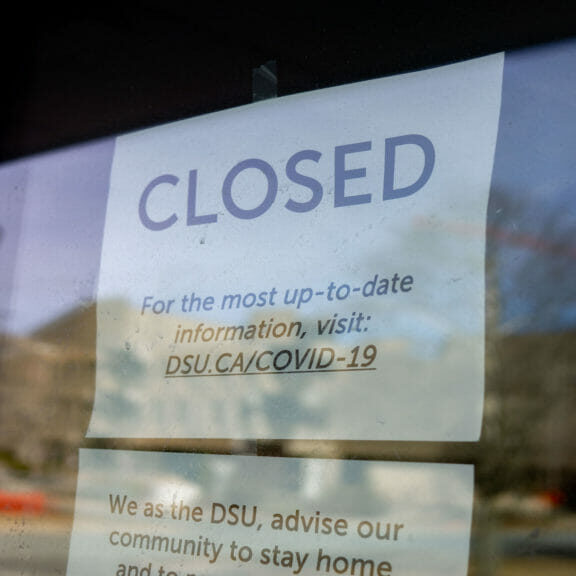
A SUB-par situation for student union employees
Grawood closes once again, this time due to COVID-19
The arrival of COVID-19 in Nova Scotia prompted Dalhousie University and the Dalhousie Student Union to close down the Student Union Building and its operations. This means the DSU is taking a financial hit, and struggling to support its students during the pandemic.
Among the hardest hit by the closures are student employees. One of them is Grawood bartender and 2020-2021 DSU President-elect Maddie Stinson, who is preparing to begin her term during a global pandemic.
“Two weeks ago, what I imagined my last month and a half looking like has completely gone out the window,” said outgoing DSU President Aisha Abawajy.
What support the DSU will provide for its student employees is still undetermined. Abawajy says the executive team is currently looking at what similar organizations are doing to figure out the best path forward.
However, for Grawood staff who are taking another hit to their income after already suffering from the inability to serve alcohol for over two weeks in October, they will most likely be left to apply for government support. Grawood staff contracts with the DSU end on April 30.
The closure of the SUB means the DSU’s operating budget won’t have enough money to pay the remaining salaries of employees, according to VP of Finance and Operations Isa Wright.
At the DSU council meeting held virtually on March 27, council passed a motion to create a bursary of up to $1,000 for students who have seen their income or housing adversely affected as a result of COVID-19.
Former DSU staff who lost their jobs when the SUB closed will receive priority for the bursary, to which the DSU has currently allocated $50,000. This means it’s possible only 50 staff and students in total are granted support.
DSU council and the committee in charge of the bursary says they will look into accessing more funds for the bursary. While their budget won’t allow it, Wright says this offers a way for the DSU to support their employees.
DSU is losing money
While the DSU presidency will be transitioning from Abawajy to Stinson on May 1, it’s unclear when DSU services will be operating at full capacity again on campus.
“This definitely does seem long term,” says Abawajy. “As of right now, June 1 is the date that’s kind of been very casually passed around.” Meaning, while the SUB was closed and operations were shuttered under Abawajy, it will likely be Stinson taking charge of when they reopen and how the DSU will move forward.
“We all want to come back to campus, we all want to be together,” said Stinson, “and students who need support, whether it be with food, or finances, or mental health, or places to stay. We will figure it out. Because there’s no option but to figure it out.”
This attitude is shared by the current DSU executive, who spoke with the Dalhousie administration and ensured there was a guarantee from the university that students who didn’t have somewhere to go would not be forced to leave residence, according to Abawajy.
“My biggest concern coming in is keeping the Dal community hopeful,” said Stinson.
She says she’ll be entering the position in a way no one has before, literally and figuratively. The transitionary meeting between past and future presidents, which is traditionally in-person, will now be online. What the world will look like at the beginning of the fall term remains uncertain.
Like many of the businesses forced to close by the virus, the DSU will also face a negative financial impact, and not only from revenue lost from the SUB closure. Even if the SUB is able to re-open on the tentative date of June 1, all summer classes have been moved online, meaning even less people on campus than usual for the term.
“The budget was based on estimations of a non-coronavirus situation,” said Abawajy. One of the biggest questions on both Abawajy and Stinson’s mind is orientation week and DalFest.
The funding for DalFest was cut under the recently presented budget to DSU council, with plans to turn it into a one day event with a more expensive artist performing. The money for orientation week and DalFest is mostly made up of sponsorships and ticket sales, and Abawajy said “we’re trying to figure out whether that event can even happen.”
Not just a funding issue
Aside from the monetary concerns, it is also impossible to predict if the current social distancing measures will be necessary come September, leaving the possibility that the events with crowds could be unsafe.
“My plans straightaway will be to start thinking of a backup plan,” said Stinson, who ran her campaign on a platform of creating a strong sense of community on the Dalhousie campus. “We have a lot of first years coming to us who need to […] start this new journey in their life, through this new time period, and connecting with others is a huge part of that,” she said.
While Stinson hopes everything will be able to take place as usual, she says postponing the events is an option. “Maybe we run those events during ‘snow week’ in the second semester,” she said.
Stinson also said there could be concerns with student health in residences after such an outbreak.
“When everyone comes back to campus, it’s like, you know, sending kids to daycare,” she said. “It might be likely that Dalhousie or the student union does need to come up with some sort of long term, you know, health protection policy. Something that we follow in order to keep students and faculty and community members safe.”






